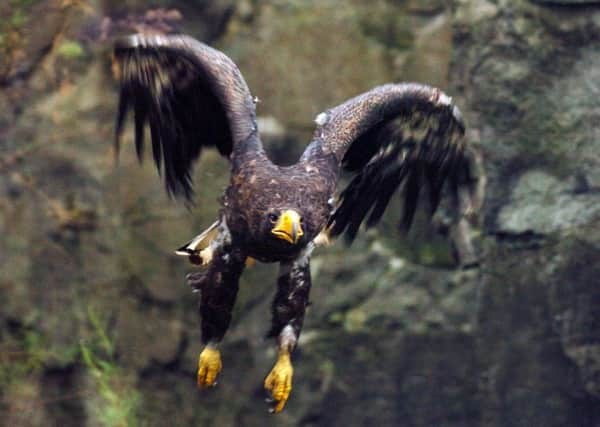Thousands spent on saving lambs from birds of prey


Sea eagles were deliberately reintroduced to Scotland in 1975 and farmer and crofters have complained ever since that they prey on lambs.
After finally admitting the problem last year, Scottish Natural Heritage (SNH) has so far spent £200,000 trying to encourage sea eagles, which have a wingspan of up to 8ft, to eat fish instead.
Advertisement
Hide AdAdvertisement
Hide AdA Freedom of Information request has revealed that part of the cash went on “flashing hawkeyes” – a spinning picture of a raptor with a mirror underneath to create a flash from the sun.
SNH have so far bought two of the devices costing almost £500 each. They are being trialled at a farm in Wester Ross.
Scary men – inflatable scarecrows with giant arms – have also been purchased in a bid to keep the sea eagles at bay.
Almost 30 have been purchased at a cost of £11,380. Also recommended for use are “diversionary fishponds”. These are ponds built near farms and stocked with fish in a bid to tempt the giant sea eagles away from livestock.
In all, £210,415 has been spent by SNH trying to limit the sea eagles’ appetite for fresh lamb. Other measures include shepherding, fence building and supplementary feeding.
Land managers are also paid to leave deer and goat carcasses on hillside to draw birds away from lambs.
Even these measures have not proved enough for some farmers who have resorted to “homemade scaring devices such as plastic bags on sticks”, said the FoI response.
A spokesman for TaxPayerScotland said: “It’s pretty damning that despite the thousands of pounds thrown at this, the problem persists.
Advertisement
Hide AdAdvertisement
Hide Ad“Taxpayers will wonder whether they should be picking up the bill for protecting what is essentially private property. In tight financial times, every single penny of taxpayers’ money needs to deliver value for money.”
Andrew Bauer, deputy director of Policy of the farmers’ union NFU Scotland, said: “I don’t think it’s unreasonable. I think it’s completely justifiable.
“These farmers are incurring a private loss to their business because of public good – the sea eagles.”
He continued: “SNH acknowledge that sea eagle predation on live lambs does occur. The numbers of sea eagles is going up very rapidly. This problem isn’t going to get any smaller.”
Commenting on the devices used he said: “The scaring devices maybe work for short periods of time but they are bold birds and they get used to them quickly.”